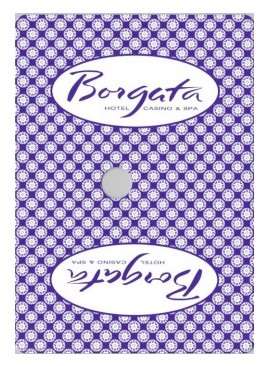Phil Ivey Edge-Sorting Case: Gemaco, Borgata Duel with Summary Judgment Filings
More news from the legal halls of New Jersey, where the “edge-sorting” lawsuit surrounding the antics of poker pro Phil Ivey and a sharp-eyed companion back in 2012 at the high-stakes mini-baccarat tables of the Borgata Hotel Casino & Spa have resulted in continuing legal clashes, as the Borgata continues its attempts to make someone else pay for the $9.626 million in losses the casino suffered at Ivey’s hands.
 The latest newsworthy legal skirmishes feature the Borgata and Gemaco, the Kansas City-based cardmaker who produced the cards used at the tables where Ivey and his partner, Cheng Yin “Kelly” Sun, pulled off their edge-sorting scheme. Gemaco was named as a co-defendant by the Borgata’s attorneys back in 2014 when the clawback case against Ivey was filed, though on a separate series of allegations from that launched against the two self-described advantage players.
The latest newsworthy legal skirmishes feature the Borgata and Gemaco, the Kansas City-based cardmaker who produced the cards used at the tables where Ivey and his partner, Cheng Yin “Kelly” Sun, pulled off their edge-sorting scheme. Gemaco was named as a co-defendant by the Borgata’s attorneys back in 2014 when the clawback case against Ivey was filed, though on a separate series of allegations from that launched against the two self-described advantage players.
In the latest legal happenings, Gemaco filed a motion for summary judgment in late January, seeking to have that portion of the Borgata’s claims dismissed, and the Borgata this week filed its own motion for summary judgment in response. Though the Borgata-v-Gemaco portion of the case hasn’t drawn as much attention as the primary part of the case involving Ivey, it’s inherently intertwined, as the Borgata does everything in its legal power to present itself as the innocent victim in the case.
The primary issue, in the latest filings featuring the Borgata-Gemaco tussle, is whether the cards supplied by the cardmaker to the casino were in way “defective” or were in violation of the contract between the two companies. (In the Borgata’s case, technically, the deal was with parent company Marina District Development Company, LLC). Prior to this flurry of recent filings, Gemaco’s presence within the case had been relatively low key, as if the two sides were waiting to see how the primary thrust of the case, the Borg’s continuing pursuit of Ivey and Sun, appeared to be playing out.
For whatever reason, that seeming civility has ended, and the case has evolved into a fully pitched, three-way battle. From Gemaco’s late-January filing for dismissal, which wholly blames the Borgata for allowing Ivey and Sun to manipulate the game in a way that gave the pair a mathematical edge:
“… On Ivey and Sun’s four gaming trips, Borgata allowed Ivey and Sun to control nearly every aspect of the game by allowing Ivey and Sun to manipulate the playing cards and allowing for concessions not in the ordinary course of play. Borgata allowed for ‘special arrangements,’ which included a private pit to play, increased betting limits, the protracted use of cards if Ivey and Sun wanted them to be used, the use of a specific shuffling machine that would not alter the direction the cards were facing when they were shuffled, the use of Mandarin Chinese speaking dealers who would communicate with Ms. Sun, and the allowing of Ms. Sun to direct the manner in which the cards would be turned over, either flipped or turned one way or the other. Ms. Sun directed the dealers on when and how to turn the card based on saying whether the card was ‘bad’ or ‘good’ — this according to the Borgata, allowed Sun to align the cards to allow a “first card advantage.”
“It is well known by the Borgata and the casino industry in general that playing cards are not perfectly cut and that there are asymmetrical patterns that can exist on the backs of cards. These cards, even with asymmetrical patterns, are acceptable and used every day in regular casino gaming without any issues. Borgata alleges that Ivey and Sun cheated the casino by engaging in a practice known as ‘edge sorting.’ Borgata further alleges that the playing cards used in the games and manufactured by [Gemaco] were defective and that this defect allowed Ivey and Sun to engage in ‘edge sorting.’ Borgata has not provided any evidence of any defect of the cards that were used in the our dates of play. Borgata has also conceded that ‘edge sorting’ cannot take place in the normal mini-baccarat table game play and that it was the special arrangements that Borgata permitted and agreed to allow that gave Ivey and Sun the ability to use ‘edge sorting’ and allegedly gain ‘first card’ advantage. Notwithstanding these facts, Borgata fails to acknowledge its own role in facilitating Ivey and Sun’s edge sorting… .”
Later, the Gemaco filing noted:
“Specifically, the contract [between Borgata and Gemaco] excludes any liability for gaming losses.”

A sample “Purple Gem” Borgata GemPak card, similar to that in the 2012 mini-baccarat games involving Phil Ivey.
As mentioned, one of the Borgata’s assertions is that Gemaco must be held liable because the card backs in question were not “identical” as called for within New Jersey’s Casino Control Act, despite the fact that the production of truly identical card backs is a mathematical and physical impossibility. The Borgata’s latest filing against Gemaco also makes no mention of Sun’s exceptional card-identification skills in that regard, as by her and Ivey’s own testimony, the so-called “Queen of Sorts” may be the only person in the world with such highly trained, card-specific visual acuity.
The Gemaco filing referenced the Borgata’s ongoing assertions that they weren’t aware of minor card-back asymmetries by essentially stating that the casino has been lying all along, if not in so many words. From the recent Gemaco memorandum:
“Importantly, Borgata’s corporate representatives have testified that there are deviations in the back of all playing cards. Borgata employees have discussed the issue of asymmetrical backs on at least ten occasions. Borgata’s Director of Casino Administration, Vincent Alfieri, conceded that the backs of playing cards do not have to be perfectly symmetrical. He testified that about 30 years ago [emphasis mine] he first learned that the card cutting process produces some cards with asymmetrical backs. Mr. James Bruno, Borgata’s Director of Table Game Operations, conceded that the card cutting manufacturing process is not perfect. He testified that about 15 years ago, he first learned that the card cutting process produces some cards with asymmetrical backs. Mr. Bruno acknowledged that there is an industry standard where the backs of playing cards are allowed to be 1/32 inch asymmetrical and he confirmed that all playing cards are asymmetrical.”
And now on to the Borgata’s most recent filing, which admits to no negligence whatsoever on the part of the casino, and frankly and laughably tries to paint the casino as the most innocent of babes in the woods:
“At this juncture, the Court is well aware of the facts of this case. Despite all Defendants’ attempts to spin the facts in their favor, the relevant facts are uncontested. Gemaco now seeks to avoid all liability by relying on the “economic loss” rule and one of two warranties contained in the playing card agreement between Gemaco and Borgata. The “economic loss” rule does not apply to Borgata’s tort claims because independent duties were imposed on Gemaco with respect to the playing cards by the Casino Control Act. Because Gemaco breached those duties and because such breaches were a proximate cause of Borgata’s damages, summary judgment must be granted to Borgata on those claims.”
The Borgata filing continues by averring that the Borg should prevail, in essence, because the cards that Gemaco supplied were never compliant under New Jersey’s Casino Control Act, and thus violated an unlimited “Regulatory Compliance” provision in the contract between the two:
“Gemaco also misreads its own contract to argue that all warranty claims have a limited remedy, a consequential damages exclusion, and an implied warranty exclusion. Instead, the contract contains two distinct warranties, the second of which is a promise by Gemaco to comply with all applicable governmental regulations. This ‘Regulatory Compliance’ warranty is not limited in any way and expressly provides that Borgata is entitled to seek any and all legally available damages for its breach. … Gemaco breached its promise to comply with the regulations regarding card backs.”
In conjunction with the filing, Borgata employees and expert witnesses prepared a series of exhibits claiming that the many of the cards selected at random for examination exceeded the 1/32-inch print variation that Gemaco has previously asserted was “industry standard” for the trimming of playing cards. The cardmaker supplied many thousands of pre-cut, pre-sorted packs of cards to the casino as part of its ongoing contract with the New Jersey facility.
Further, the casino alleges, even the 1/32-inch print variance isn’t an industry standard after all, but is instead an internal Gemaco allowance based on the printing and trimming capabilities of Gemaco’s cardmaking equipment, and thus is an invalid claim, since New Jersey’s CCA mandates that all card backs in a given deck be identical. Note that this assertion directly belies the testimony of the Borgata’s own table-games boss, James Bruno, as offered in the Gemaco filing excerpted above. On this matter, the Borg’s attorneys also wrote the following:
“… It was only after Borgata contacted Gemaco regarding the Ivey and Sun incidents that Gemaco disclosed its internal 1/32” cutting tolerance. Gemaco cannot claim lack of notice. Gemaco knew its cards were asymmetrical, capable of being sorted, and therefore not in compliance with CCA regulations. Given the limitations of its manufacturing process, Gemaco concedes that it could not have provided a compliant product under any circumstances.”
As the first point in in its argument against Gemaco’s prior filing, the Borgata counterfiling notes:
“This case is ripe for summary judgment because the playing cards manufactured and supplied by Gemaco are not in compliance with New Jersey regulations and are defective even according to Gemaco’s subjective interpretation. Given the uncontested facts, Gemaco is not entitled to summary judgment against Borgata, but the opposite is true. Borgata is entitled to summary judgment on its claims against Gemaco.”
The filing concludes by asserting that it was the slightly asymmetrical cards that were the cause of the $9.626 million loss, instead of, perhaps, the Borgata’s own willingness to accede to the extreme and unusual requests put forth by Ivey and Sun as the basis for their scheme. As part of the filing’s summary, Borgata counsel Jeremy Klausner wrote:
“Despite Gemaco’s attempt to re-write the record, there is no question that the playing cards at issue breached the applicable warranties. They were defective according to Gemaco’s own definition, they clearly did not comply with applicable regulations, and they were not properly inspected. The miscut cards were a proximate cause of Borgata’s damages under any formulation.”


















COMMENTS